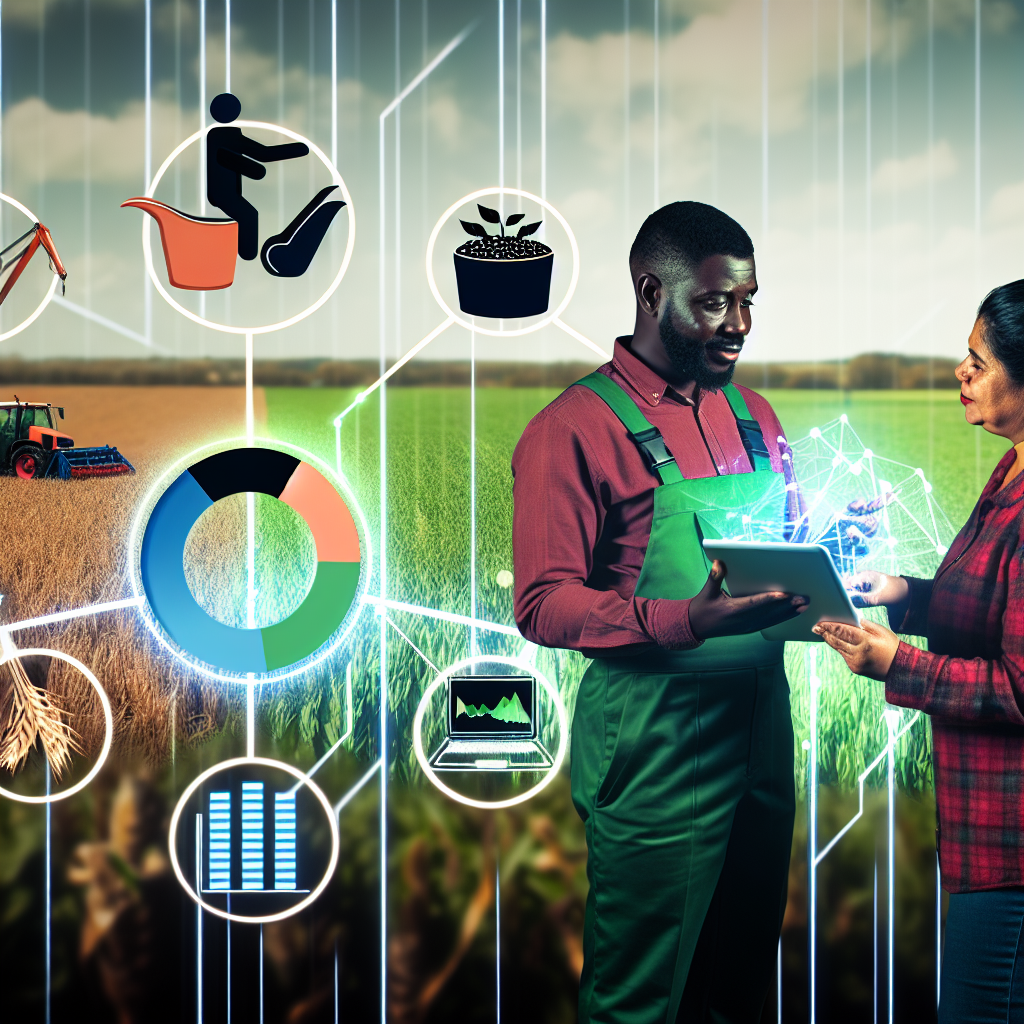Introduction to Agri-Fintech
Agri-Fintech merges agriculture and finance using technology.
This innovative sector plays a crucial role in modern farming.
It simplifies access to financial services for farmers.
Technology helps bridge the gap between rural farmers and financial institutions.
Overview of Agri-Fintech
Agri-Fintech encompasses various technologies tailored for the agricultural sector.
These tools address unique challenges faced by farmers globally.
Solutions include mobile banking, insurance, and credit services.
For instance, farmers can use apps to apply for loans quickly.
Such resources empower farmers to manage their finances effectively.
Importance in Modern Agriculture
Access to financial services significantly enhances agricultural productivity.
Farmers can invest in better seeds and equipment with financial assistance.
Moreover, timely financial support can mitigate the risk of crop failure.
In addition, it enables farmers to adopt sustainable practices.
Thus, Agri-Fintech fosters resilience in the agriculture sector.
Changing Dynamics of Rural Financing
Traditionally, farmers faced challenges in accessing capital.
Transform Your Agribusiness
Unlock your farm's potential with expert advice tailored to your needs. Get actionable steps that drive real results.
Get StartedNow, digital platforms provide seamless access to financial services.
This shift encourages innovation and growth in rural economies.
Furthermore, it enhances financial literacy among farmers.
As a result, more farmers are equipped to make informed financial decisions.
The Challenges Farmers Face in Accessing Financial Services
Understanding Financial Barriers
Farmers encounter significant financial barriers in their operations.
Many face difficulties in securing loans from traditional banks.
Approval processes often require extensive documentation.
Inadequate credit histories further complicate their access to funds.
The Impact of Market Fluctuations
Market volatility affects farmers’ income and financial stability.
Many farmers struggle to predict market trends accurately.
Consequently, this uncertainty deters lenders from providing financial support.
The cyclical nature of farming creates additional challenges.
Farmers need financial services tailored to their unique risks.
Limited Financial Literacy
A significant gap exists in farmers’ financial literacy levels.
Many farmers lack essential knowledge about financial products.
This deficiency inhibits their ability to make informed decisions.
As a result, they may miss opportunities for better financing solutions.
Geographic Challenges
Rural areas often lack adequate financial services infrastructure.
Many banks do not operate in remote farming regions.
Accessibility to financial services is limited by location.
Farmers frequently must travel long distances to reach financial institutions.
Risk-Aversion from Financial Institutions
Financial institutions typically exhibit risk aversion towards agriculture.
They perceive farming as a high-risk investment.
As a matter of fact, this leads to stricter lending criteria.
Showcase Your Farming Business
Publish your professional farming services profile on our blog for a one-time fee of $200 and reach a dedicated audience of farmers and agribusiness owners.
Publish Your ProfileConsequently, many farmers face rejections from loan applications.
Technological Barriers
While technology offers solutions, access remains limited for many farmers.
Lack of internet connectivity hinders the use of fintech services.
Farmers may also struggle with using financial technology tools.
As a result, they miss out on innovative financing options.
How Agri-Fintech Companies are Addressing Farmers’ Financial Needs
Enhancing Access to Credit
Agri-fintech companies provide farmers with easier access to credit.
They leverage technologies to assess creditworthiness quickly.
This process reduces the reliance on traditional credit scoring systems.
Farmers receive timely financial support for their operations.
Streamlining Transactions
Financial technology simplifies payment processing for farmers.
These companies facilitate instant transactions for agricultural goods.
Consequently, farmers can manage cash flow more effectively.
This efficiency boosts their overall profitability.
Providing Financial Literacy Resources
Agri-fintech firms invest in educational initiatives for farmers.
They offer training on financial management practices.
This knowledge empowers farmers to make informed decisions.
Ultimately, it enhances their financial stability.
Utilizing Data Analytics for Risk Management
Data analytics plays a crucial role in risk assessment.
Agri-fintech companies analyze market trends and weather patterns.
This information helps farmers mitigate potential losses.
By understanding risks, they can make better planning choices.
Creating Customized Financial Products
Agri-fintech companies design products tailored to farmers’ needs.
They consider various crop cycles and regional conditions.
This customization increases accessibility to necessary funds.
Farmers can now obtain loans that suit their specific situations.
Gain More Insights: Smart Farming Tools Boosting Efficiency and Sustainability on Farms
Case Studies: Successful Agri-Fintech Solutions and Their Impact
Microfinance for Smallholder Farmers
Microfinance institutions, like AgriFunds, have transformed farmer access to credit.
They provide small loans to farmers without requiring collateral.
This approach reduces the financial barrier for many smallholders.
In one case, a group of farmers utilized these loans to purchase better seeds.
The outcome was a 30% increase in crop yield within one season.
Subsequently, farmers in this group reported improved household incomes.
Moreover, they could invest in equipment to enhance productivity further.
This success demonstrates the critical role of microfinance in agriculture.
Insurance Solutions for Climate Risks
Crop insurance company GreenShield offers innovative solutions for farmers.
They provide weather-based insurance products tailored for diverse crops.
The insurance is tied to real-time weather data, ensuring transparency.
In 2022, they launched a program in Southeast Asia targeting rice producers.
Farmers benefited from these policies during unexpected floods.
The program helped stabilize incomes for over 5,000 farmers.
Showcase Your Farming Business
Publish your professional farming services profile on our blog for a one-time fee of $200 and reach a dedicated audience of farmers and agribusiness owners.
Publish Your ProfileConsequently, it reduced the financial losses faced during adverse weather conditions.
Such initiatives illustrate the importance of risk management for farmers.
Digital Marketplaces for Crop Sales
Platforms like FarmBridge connect farmers directly to consumers and retailers.
These digital marketplaces eliminate middlemen in the supply chain.
Farmers can list their produce in real-time, enhancing market access.
In a recent trial, farmers observed a 15% increase in sales revenue.
Additionally, consumers enjoyed fresher produce at competitive prices.
This approach emphasizes efficiency in agricultural marketing.
Furthermore, these platforms facilitate better price transparency.
FarmBridge showcases how technology can transform crop sales.
Agri-Tech Collaboration for Financial Literacy
EduAgri has partnered with fintech firms to enhance farmer financial education.
They offer workshops on budgeting, saving, and investment strategies.
This collaboration empowers farmers to make informed financial decisions.
Recent workshops reached over 1,000 farmers across various regions.
Feedback indicates that participants feel more confident in managing finances.
This increased knowledge leads to better implementation of fintech solutions.
Thus, financial literacy becomes a cornerstone of agricultural advancement.
Blockchain for Supply Chain Transparency
TraceAgri employs blockchain technology to track food supply chains.
This innovation increases transparency from farm to table.
Farmers benefit by establishing direct connections with consumers.
In a recent application, they helped a group of coffee producers.
Each step of their coffee’s journey is documented and accessible to consumers.
As a result, farmers earned a premium for their sustainable practices.
This case highlights blockchain’s potential in enhancing supply chain integrity.
Moreover, consumers gain trust in the products they purchase.
Delve into the Subject: Pest Resistance In Genetically Modified Crops Explained
The Role of Technology: Innovations Driving Agri-Fintech Forward
Enhancing Access to Financial Services
Innovations in technology are making financial services more accessible to farmers.
Mobile applications enable farmers to easily apply for loans.
Additionally, digital platforms connect farmers with investors and lenders.
As a result, these solutions bridge the gap between agriculture and finance.
Data-Driven Decision Making
Technology empowers farmers to make informed decisions based on data.
Data analytics helps them understand weather patterns and crop conditions.
Moreover, these insights lead to optimized planting and harvesting schedules.
Consequently, farmers can increase yields and reduce losses.
Improving Financial Literacy
Agri-fintech solutions also focus on enhancing farmers’ financial literacy.
Online courses and resources provide essential financial education.
Farmers learn how to manage budgets and understand credit scores.
This knowledge leads to better financial decisions and healthier businesses.
Reducing Transaction Costs
Technological advancements lower transaction costs for farmers.
Online payments and digital wallets eliminate the need for cash transactions.
Showcase Your Farming Business
Publish your professional farming services profile on our blog for a one-time fee of $200 and reach a dedicated audience of farmers and agribusiness owners.
Publish Your ProfileAs a result, farmers save time and money when conducting transactions.
This efficiency encourages more financial activities within rural communities.
Innovative Lending Models
Agri-fintech introduces new lending models tailored for farmers.
Peer-to-peer lending connects farmers directly with individuals willing to invest.
Additionally, crowdfunding platforms allow farmers to raise funds for projects.
These models promote financial inclusion and diversify funding sources.
Future Trends in Agri-Fintech
The future of agri-fintech looks promising, with ongoing innovations.
Artificial intelligence will enhance personalized financial products for farmers.
Blockchain technology may offer secure and transparent transactions.
With these advancements, agri-fintech will continue to grow and evolve.
See Related Content: How IoT Enhances Precision Farming Techniques

The Intersection of Agriculture and Blockchain: Enhancing Transparency and Trust
Understanding Blockchain Technology
Blockchain technology is revolutionizing multiple industries, including agriculture.
It offers a decentralized platform that enhances security and accessibility.
This technology enables real-time data sharing among stakeholders.
Improving Supply Chain Transparency
Farmers can utilize blockchain to track their products from origin to consumer.
By doing so, they enhance accountability throughout the supply chain.
This process helps reduce fraud and increases consumer confidence.
Building Trust with Smart Contracts
Smart contracts automate transactions based on predefined conditions.
These contracts reduce the need for intermediaries, saving time and costs.
Moreover, they ensure that all parties fulfill their obligations without disputes.
Enhancing Financial Inclusion
Many farmers lack access to traditional banking services.
Blockchain can facilitate microloans tailored for agricultural needs.
Access to these financial tools empowers farmers to invest in their operations.
Case Studies in Agri-Fintech
Several companies are leading the charge in agri-fintech innovations.
- AgroTech Solutions has implemented blockchain for secure supply chains.
- FarmConnect enables farmers to access microloans effortlessly.
- GreenChain uses technology to ensure transparency in organic farming.
The Future of Agriculture with Blockchain
As technology evolves, blockchain’s role in agriculture will expand.
Farmers will increasingly adopt digital tools for better decision-making.
Ultimately, this shift will lead to a more sustainable agricultural ecosystem.
Explore Further: Connecting Farmers To Global Markets With Blockchain Technology
Regulatory Landscape
Understanding Compliance in Agri-Fintech
The agri-fintech sector operates within a complex regulatory environment.
These regulations vary by region and are influenced by local agricultural practices.
In many countries, compliance is essential for fostering trust between farmers and financial service providers.
Regulatory bodies oversee financial operations to ensure fairness and transparency.
For instance, the Financial Conduct Authority in the UK plays a crucial role in this ecosystem.
Additionally, companies must adhere to the guidelines set by banking authorities and agricultural departments.
Key Regulations Impacting Agri-Fintech
Several key regulations significantly influence the agri-fintech landscape.
- Data protection regulations safeguard farmers’ personal information.
- Anti-money laundering laws prevent illicit financial activities.
- Consumer protection laws ensure fair treatment of all users.
- Financial stability regulations safeguard the market during economic fluctuations.
Challenges in Navigating Compliance
Navigating compliance can be challenging for new agri-fintech startups.
Many lack the resources to fully understand complex legal frameworks.
Moreover, the rapid pace of technological advancement often outstrips regulatory updates.
This scenario creates potential risks for both farmers and service providers.
A lack of clarity can lead to unintentional non-compliance.
Showcase Your Farming Business
Publish your professional farming services profile on our blog for a one-time fee of $200 and reach a dedicated audience of farmers and agribusiness owners.
Publish Your ProfileBenefits of Compliance
Despite the challenges, adhering to regulations offers several advantages.
Establishing compliance builds credibility among stakeholders.
Additionally, it enhances the security of financial transactions.
It also fosters investor confidence, leading to increased funding opportunities.
Finally, compliant agri-fintech firms may benefit from government support and initiatives.
Future Trends in Agri-Fintech Regulation
As the agri-fintech sector evolves, regulatory frameworks will likely adapt.
Expect an increase in regulations focused on digital currencies and blockchain technology.
Furthermore, regulations addressing climate-related financial risks may emerge.
These trends emphasize the need for proactive compliance strategies.
Staying informed about changing regulations is crucial for success in this industry.
Future Trends: Predictions for Agri-Fintech and Its Role in Sustainable Farming
Emerging Technologies in Agri-Fintech
Technology plays a crucial role in the future of agri-fintech.
Innovations will enhance efficiency and accessibility for farmers.
Artificial intelligence is set to revolutionize financial analysis.
Furthermore, blockchain technology will improve transparency in transactions.
Farmers will benefit from better data management and insights.
Increased Collaboration and Partnerships
The agri-fintech sector will see expanded collaborations.
Financial institutions will partner with agricultural tech companies.
This collaboration will drive innovative solutions tailored for farmers.
Consequently, farmers will access a wider range of financial products.
Partnerships can also facilitate training and support for farmers.
Focus on Sustainability and Climate Adaptation
Sustainability will become a central theme in agri-fintech.
Companies will create financial products that promote environmental stewardship.
For instance, loans for sustainable farming practices will emerge.
Additionally, agri-fintech can aid farmers in climate adaptation strategies.
These tools will enhance resilience against climate change impacts.
Integration of Mobile Technology
Mobile technology will have a significant impact on agri-fintech.
Farmers will increasingly rely on mobile applications for financial services.
Access to information will drastically improve through these platforms.
Moreover, real-time data will inform better decision-making.
This technology ensures that financial assistance is just a click away.
Regulatory Evolution and Compliance
Regulatory frameworks will evolve to embrace agri-fintech innovations.
Governments will recognize the importance of supporting sustainable practices.
New regulations may emerge to protect both farmers and financial institutions.
Compliance will become essential for fintech companies in agriculture.
These changes will ultimately foster a more stable agri-fintech landscape.
Additional Resources
Agenda – World Agri-Tech South America Summit
Bridging funding gaps for climate and sustainable development …




